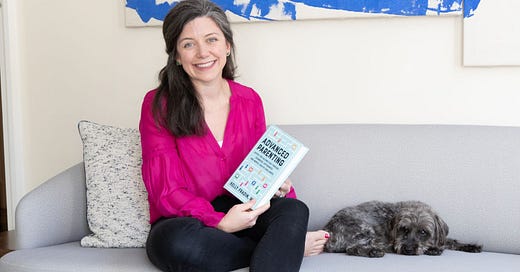Advanced Parenting is out today!
Here’s a sneak peek excerpt from the introduction. Thank you for your support!
I am excited to announce that after months of hard work and anticipation, my new book Advanced Parenting has finally made its debut and is available now!
To celebrate this exciting day, I’ve dedicated today’s newsletter to you, the parents for whom I wrote the book. For those of you who feel overwhelmed by what they face, I hope that this book can be a living resource that you can turn to, no matter the challenge you face.
Below is an excerpt from the Introduction, happy reading and thank you so much for your support!
An excerpt from the Introduction of Advanced Parenting: Advice for Helping Kids Through Diagnoses, Differences, and Mental Health Challenges.
One sunny day in 2014, I was riding the New York City subway back from the Children’s Hospital at Montefiore, where I was working as an attending in the pediatric complex-care group. Our group of pediatricians, nurses, social workers, and care coordinators supported children with severe medical conditions. Only children facing a severe, life-limiting condition such as an organ transplant, congenital heart disease, or chronic respiratory failure requiring long-term use of a breathing tube or ventilator could qualify for the program. We also accepted children who had two less-severe medical conditions—we wouldn’t take a child with just inflammatory bowel disease or just cerebral palsy, but if your child had both, it was likely that they would need our support. For the family’s convenience and continuity of care, we also took care of these children’s siblings.
This day had been a tough day in a tough week, and a hospitalized patient was not improving. Her underlying genetic disorder and associated medical comorbidities had led to malnourishment. Her poor nutrition had led her to have difficulty with the healing of the skin surrounding her feeding tube, her feeding tube troubles were worsening her malnutrition, and she had just gotten a cold, limiting our ability to do much of anything until her fever subsided and her need for supplemental oxygen decreased. At an hour-long meeting, in which I worked with her family to help coordinate her care, there had been raised voices and tears as they grappled to understand why this was happening, why now, and how to make the best plan with conflicting input from the surgeons, nutritionists, gastroenterologists, and others involved in the case.
A New Field
I appreciated having time to decompress and process the day on the way home from work. This day I sat on the subway, scrolling through social media and rethinking my work with this family and how I could do more to help them, when a friend from my neighborhood called. At just age two, her son had been diagnosed with asthma after several colds involving extreme wheezing. She was struggling to understand why this was happening, why now, and how to make the best plan with input from her husband, mother-in-law, pediatrician, and new pulmonologist. My first thought was that mild asthma is easy compared to what I do day to day with really sick kids. Still, as I talked through things with her, I could not ignore the similarities in these families’ struggles.
These children were in wildly different places—one was hospitalized and threatened with admission to the ICU, and the other was at the playground; each experienced entirely unrelated problems, one with a genetic diagnosis and one more likely triggered by environmental factors—and yet the parents were coping with similar stress. How could they process their situation, make sense of it, and move forward? I knew I could help them both. I could help them understand and research what they faced, find resources that they needed to make decisions with confidence, and put together a team approach to be proactive and preventive in the future with their child’s health.
But at the same time, I thought, this work does not fit within a fifteen-minute visit or a message sent through a health-care portal. I wondered why the systems weren’t set up to better support these families.
Parenting is hard. Because we care so deeply for our children, as parents we want things to be perfect. As a parent, you want things to go as planned. You want to be prepared for every developmental change and anticipate your child’s needs to properly support them. But parenting is even harder when things do not follow a typical trajectory.
When your child deviates from the typical developmental pathway or when they are struggling with their physical or mental health, everyday challenges become much more intense. The fear and the uncertainty can be overwhelming. For parents raising children with these additional needs, there seem to be, oddly, fewer resources. While parents are drowning in parenting content and consuming it at an all-time high, most parenting advice is geared toward average children facing typical challenges, from getting a baby to sleep to helping a teen with their nascent independence.
Why is it that we leave so many parents adrift for what is, for many, the hardest part of their lives? Historically, families with children with health challenges have faced stigma. Though we are thankful to live in a more inclusive society, and though we know that nearly one-third of children experience chronic medical conditions, the available resources haven’t caught up.
There is a growing awareness that some parents need access to additional caregiving skills—advanced parenting skills that can help them support their children through a challenge.
Advanced Parenting
Thank you for your support and encouragement, I couldn’t have done it without you!
P.S. Found this helpful? Share with your friends and loved ones to remind them that they’re not alone! And they have tools and strategies at their disposal if they know where to look! [Hint: Advanced Parenting!]










